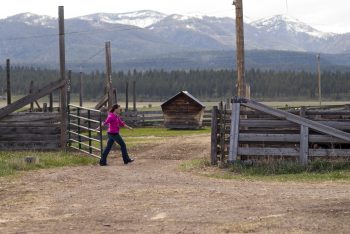MSU researchers conduct research to better understand why young adults choose to move to rural Montana
by Anne Cantrell, MSU News Service
BOZEMAN — It’s common to hear about young adults choosing not to live in rural Montana, but what often goes undiscussed are the reasons young adults do choose to move to rural parts of the state, according to Montana State University researcher Sarah Schmitt-Wilson.
“There’s a huge misconception that young adults are not actively choosing to live in rural Montana,” said Schmitt-Wilson, assistant teaching professor in the College of Education, Health and Human Development’s Department of Education.

To better understand why young adults choose to move to rural parts of Montana, MSU’s Sarah Schmitt-Wilson and her colleagues researched the experiences of educated young adults living in rural communities, as well as what those residents identify as the benefits associated with relocating to a new rural community. MSU photo by Kelly Gorham
Research has shown that, while people in their 20s often leave rural communities, a higher percentage of young adults in their 30s choose rural communities, Schmitt-Wilson said. Still, most of the research on migration of young adults to rural communities focuses on “returners,” or those choosing to move home to the community they were raised in, she added.
To better understand why young adults choose to move to rural parts of Montana, Schmitt-Wilson and her colleagues researched the experiences of educated young adults living in rural communities, as well as what those residents identify as the benefits associated with relocating to a new rural community. Schmitt-Wilson’s collaborators included Madie Hanson, who graduated in May 2020 from the MSU Department of Education with a master’s degree in adult and higher education, and Mitchell Vaterlaus, associate professor in the Department of Health and Human Development. Their work was published in December in The Journal of Rural and Community Development.
As part of their work, the researchers interviewed nine young adults with an average age of 26 ½ living in six different rural communities along Montana’s Hi-Line. The study’s participants were all from counties that were experiencing net population losses among 25 to 29-year-olds. Based on research suggesting that economic factors are important in young adults’ decisions, Schmitt-Wilson and her colleagues decided to explore the experiences of young adults with a bachelor’s degree or higher who were choosing to move to rural communities.
The researchers found that while study participants were candid about challenges associated with life in rural areas of Montana – such as a lack of amenities and geographic and social isolation – they also highlighted a number of benefits.
“Those benefits included the quality of life they experience in their rural communities, including family-centered environments, low cost of living, unconditional support provided by community members, intergenerational friendships, increased sociability and unique opportunities for personal and professional growth available for young adults in rural communities,” Schmitt-Wilson said.
Furthermore, participants shared suggestions for enticing young adults to move to rural communities, including ways they could increase occupational opportunities and better market rural areas to young adults.
Those suggestions included facilitating social connections within the community through local events, church activities, book clubs and parenting groups; revising how rural communities advertise available jobs; working to increase the number of high-skilled jobs with competitive compensation; and changing the narrative of living in a rural community by focusing on what rural communities can offer to young adults.
Schmitt-Wilson said the study is important as rural Montana communities look to the future.
“This study addresses opportunities for rural communities in terms of attracting young adults, specifically looking at the importance of social connections, occupational opportunities and a reputable salary,” she said.
The project was funded by a College of Education, Health, and Human Development research seed grant.
“With so many stories about the depopulation of the rural communities across the United States, I find this research project both encouraging and enlightening,” said Alison Harmon, dean of the College of Education, Health and Human Development. “Young adults are locating in rural towns to build high quality lives. In doing so they add to community vibrancy, support schools and businesses, and help sustain Montana’s cultural heritage.”
Schmitt-Wilson expects that related research in the future will follow young adults over time to explore how their decisions to remain in rural communities change over the course of their lives.
“There are opportunities for students to be young, educated and choosing rural,” Schmitt-Wilson said. “This study shows we can do a better job of highlighting the opportunities in rural communities for young adults.” •







